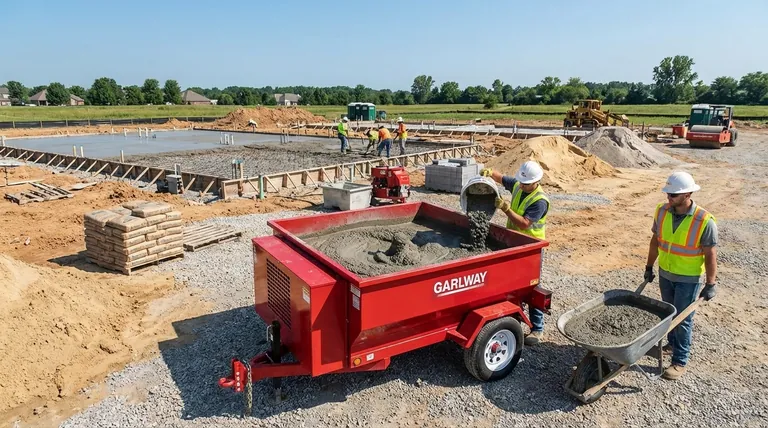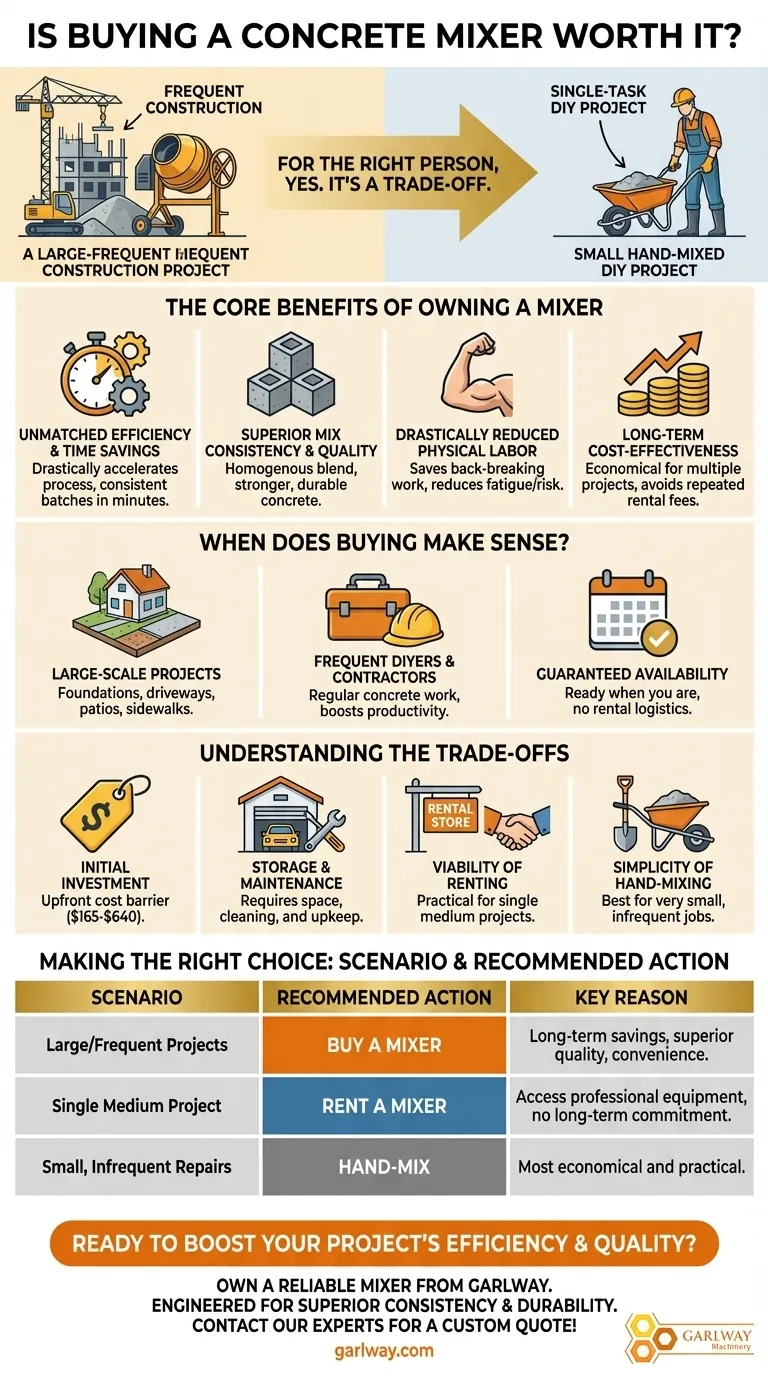For the right person, yes—buying a concrete mixer is an excellent investment. A mixer is worth the cost if you frequently work with concrete or are planning multiple large projects where mix quality and physical effort are significant concerns. For a single, small job, it is likely not a justified expense.
The decision to buy a concrete mixer hinges on the scale and frequency of your work. It's a trade-off between the upfront cost of ownership versus the long-term savings in time, physical labor, and rental fees, all while achieving a higher quality concrete mix.

The Core Benefits of Owning a Mixer
Investing in a concrete mixer transitions concrete work from a physically demanding chore into a manageable and efficient process. The benefits go beyond simple convenience.
Unmatched Efficiency and Time Savings
A mixer dramatically accelerates the process. It allows you to produce a consistent batch of concrete in minutes, a task that could take much longer by hand and leave you with less time for pouring and finishing.
Superior Mix Consistency and Quality
Mechanical mixing ensures a homogenous blend of cement, aggregates, and water. This process eliminates the lumps common in hand-mixing, resulting in stronger, more durable, and higher-quality finished concrete.
Drastically Reduced Physical Labor
Manually mixing concrete with a shovel is back-breaking work. A mixer performs the most strenuous part of the job, saving you from significant physical fatigue and reducing the risk of strain or injury.
Long-Term Cost-Effectiveness
While there is an initial purchase price, typically ranging from $165 to $640, owning a mixer can be more economical than renting one repeatedly. If you have several projects on the horizon, the cost of ownership is quickly offset by avoiding multiple rental fees.
When Does Buying Make the Most Sense?
A mixer isn't for everyone. The value of the investment is directly tied to the type and volume of work you plan to do.
For Large-Scale Projects
Tasks requiring significant amounts of concrete are the ideal candidates for a mixer. This includes pouring foundations, creating patios and driveways, or constructing sidewalks where efficiency and consistency are critical.
For Frequent DIYers and Contractors
If concrete work is a regular activity for you, owning a mixer is a clear advantage. It offers the convenience of having the right tool available for both planned and impromptu projects, boosting productivity.
For Guaranteed Availability
Owning your equipment means it's ready whenever you are. You avoid the logistics of rental store hours, availability issues, and transportation, allowing you to work on your own schedule.
Understanding the Trade-offs
Objectivity requires acknowledging the downsides. A mixer is a valuable tool, but it comes with responsibilities and may not be the right choice for every situation.
The Initial Investment
The primary barrier is the upfront cost. If you only have one small project, it can be difficult to justify the expense compared to the low cost of renting for a day or simply mixing by hand.
Storage and Maintenance Requirements
A concrete mixer is a bulky piece of equipment that requires adequate storage space. To ensure its longevity and performance, it also requires proper cleaning after every use and routine maintenance.
The Viability of Renting
For a single, medium-sized project, renting is often the most practical solution. It gives you access to a professional-grade tool for a fraction of the purchase price without the long-term commitment to storage and upkeep.
The Simplicity of Hand-Mixing for Small Jobs
For very small tasks, like setting a single fence post or a mailbox, a mixer is overkill. Hand-mixing a small batch in a wheelbarrow remains the fastest and most economical method for minor repairs.
Making the Right Choice for Your Project
Your decision should be guided by the specific demands of your work.
- If your primary focus is large or frequent projects: Buying a mixer is a wise investment that will pay for itself in time, labor savings, and superior results.
- If your primary focus is a single, medium-sized project: Renting a mixer is likely your most cost-effective and practical choice.
- If your primary focus is small, infrequent repairs: Stick with hand-mixing in a wheelbarrow, as the cost and complexity of a mixer are not justified.
Ultimately, aligning your tool with the scale of your ambition ensures a smoother, more efficient, and higher-quality outcome for your project.
Summary Table:
| Scenario | Recommended Action | Key Reason |
|---|---|---|
| Large/Frequent Projects | Buy a Mixer | Long-term cost savings, superior mix quality, and convenience. |
| Single Medium Project | Rent a Mixer | Access professional equipment without the upfront cost and storage needs. |
| Small, Infrequent Repairs | Hand-Mix | Most economical and practical for tiny batches. |
Ready to boost your project's efficiency and quality?
For construction companies and contractors managing large or frequent concrete work, owning a reliable mixer from GARLWAY is a game-changer. Our durable concrete mixers and batching plants are engineered to deliver superior mix consistency, save you time and labor costs, and ensure your projects are completed to the highest standard.
Contact our experts today to find the perfect concrete mixing solution for your business needs: Get Your Custom Quote Now
Visual Guide

Related Products
- Ready Mixer Machine for Construction Ready Mix Machinery
- Commercial Construction Mixer Machine for Soil Cement Mixing Concrete
- Auto Concrete Cement Mixer Machine New
- HZS90 Large Multiquip Concrete Mixers for Construction
- JDC350 Small Cement Concrete Mortar Mixer
People Also Ask
- Why is cleaning a concrete mixer after use important? Avoid Costly Repairs and Ensure Quality
- When was the first concrete mixer developed and by whom? Discover the 1900 Breakthrough
- What should be considered regarding the output of a concrete mixer? Match Capacity to Your Project Scale
- Why is the manufacturer's strength and service important when choosing a concrete mixer? Ensure Long-Term Project Success
- What safety considerations are important for concrete mixer operation? A Guide to Proactive Risk Management



















